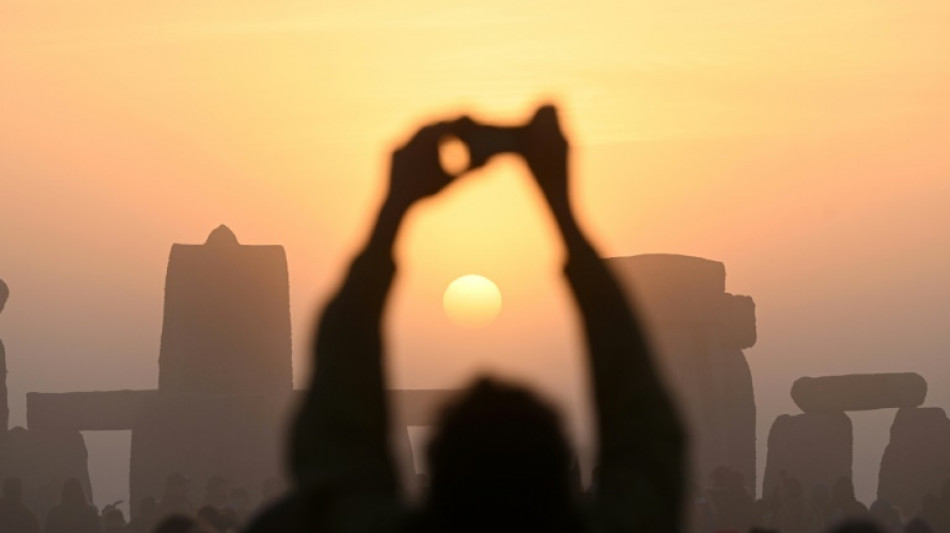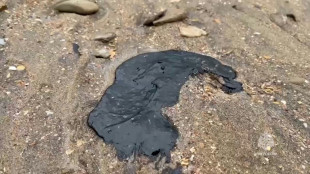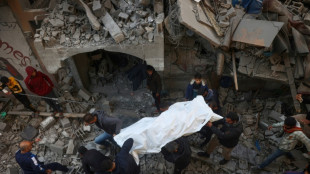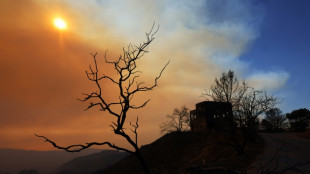
-
 UK gas reserves 'concerningly low': Biggest supplier
UK gas reserves 'concerningly low': Biggest supplier
-
New oil spill detected in Black Sea from stricken Russian tanker

-
 Weakening of Hezbollah allowed Lebanon to fill vacant presidency
Weakening of Hezbollah allowed Lebanon to fill vacant presidency
-
UN says 3 million Sudan children facing acute malnutrition

-
 UK government says England should play Afghanistan cricket match
UK government says England should play Afghanistan cricket match
-
Turkey raps France, says US only counterpart in northeast Syria

-
 Dupont questions 'logic' of South African travel in Champions Cup
Dupont questions 'logic' of South African travel in Champions Cup
-
Body of Israeli hostage identified, two days after father's: army

-
 Slot wary of Accrington's 'Champions League final' at Anfield
Slot wary of Accrington's 'Champions League final' at Anfield
-
Global stocks mostly fall before US jobs data

-
 Ubisoft: the 'Assassin's Creed' maker targeted by suitors
Ubisoft: the 'Assassin's Creed' maker targeted by suitors
-
Scots leader hails opening of UK's first drug consumption facility

-
 Italian FM meets Syria's new leader in Damascus
Italian FM meets Syria's new leader in Damascus
-
Dalin heading for victory after Vendee Globe rival loses sail

-
 Navalny lawyers face long sentences in Russian 'extremism' trial
Navalny lawyers face long sentences in Russian 'extremism' trial
-
Neuer returns but Musiala out for Bayern

-
 'Real-world harm' if Meta ends fact-checks, global network warns
'Real-world harm' if Meta ends fact-checks, global network warns
-
Auger-Aliassime belatedly beats Paul to reach Adelaide final

-
 Stock markets drift lower as US jobs data looms
Stock markets drift lower as US jobs data looms
-
Lancet study estimates Gaza death toll 40% higher than recorded

-
 South Korea's presidential security chief resigns
South Korea's presidential security chief resigns
-
Italian FM tours landmark mosque in first Syria visit

-
 'Apocalyptic': ghastly remains of Malibu come into focus
'Apocalyptic': ghastly remains of Malibu come into focus
-
Pakistan flight departs for Paris after EU ban lifted

-
 Nicolas Maduro: Venezuela's iron-fisted 'worker president'
Nicolas Maduro: Venezuela's iron-fisted 'worker president'
-
Ukraine's French-trained brigade rocked by scandal

-
 Venezuela's Maduro to take presidential oath despite domestic, global outcry
Venezuela's Maduro to take presidential oath despite domestic, global outcry
-
Red-hot Gauff vows to keep cool in Australian Open title charge

-
 Zverev says he has mindset to finally win Grand Slam in Melbourne
Zverev says he has mindset to finally win Grand Slam in Melbourne
-
Anti-war Russian theatre in Latvia fights language ban

-
 Nobel laureate Malala Yousafzai to visit native Pakistan for girls' summit
Nobel laureate Malala Yousafzai to visit native Pakistan for girls' summit
-
Shotgun watch: LA fire evacuees guard against looters

-
 Los Angeles fire deaths at 10 as National Guard called in
Los Angeles fire deaths at 10 as National Guard called in
-
'Control freak' Swiatek describes shock and 'chaos' over doping ban

-
 Vietnam jails ex-lawyer over Facebook posts
Vietnam jails ex-lawyer over Facebook posts
-
Sinner in dark over verdict as ATP says doping case 'run by the book'

-
 US President-elect Trump to be sentenced for hush money conviction
US President-elect Trump to be sentenced for hush money conviction
-
AI comes down from the cloud as chips get smarter

-
 Englishman Hall grabs share of Sony Open lead
Englishman Hall grabs share of Sony Open lead
-
Olympic champ Zheng says 'getting closer' to top-ranked Sabalenka

-
 Tajikistan bets on giant dam to solve electricity crisis
Tajikistan bets on giant dam to solve electricity crisis
-
Air tankers fight Los Angeles fires from frantic skies

-
 Right-wing disinformation targets DEI, 'liberal' policies as LA burns
Right-wing disinformation targets DEI, 'liberal' policies as LA burns
-
Osaka to play Australian Open after 'devastating' injury pullout

-
 'Disruptor' Medvedev ready to bring down Sinner and Alcaraz
'Disruptor' Medvedev ready to bring down Sinner and Alcaraz
-
Atletico can seize La Liga lead as Osasuna visit

-
 Navalny lawyers face long sentences in 'extremism' trial
Navalny lawyers face long sentences in 'extremism' trial
-
Sinner declares innocence as ATP chief says doping case 'run by the book'

-
 India's Kumbh Mela, world's largest religious gathering
India's Kumbh Mela, world's largest religious gathering
-
India readies for mammoth Hindu festival of 400 million pilgrims


Misty sunrise for the summer solstice at Stonehenge
The sun was long overdue on Tuesday but when it finally appeared, faces lit up and arms rose as one to greet the summer solstice at Britain's most famous prehistoric monument.
The sun was scheduled to come up on the longest day of the year at 4:49 am (3:49 GMT) but was shy in a sky as hazy as the minds of many of the midsummer revellers who spent the night at the sacred site.
Around 6,000 people gathered for the sunrise and sunset at 9:27 pm, according to the site's manager and police, during the first public summer solstice at Stonehenge since the coronavirus pandemic wreaked havoc in 2020.
Stonehenge was built in stages, from around 3,000 BC to 2,300 BC, and the standing stones are aligned with the movements of the sun.
"We might see it at about 10 o'clock!" joked Jade Tetlon, who made a spur-of-the-moment decision to come with a friend and his daughter for her first solstice at Stonehenge.
Surrounded by soft melodies from flutes, drums, birds singing and sheep bleating but also the trucks rumbling on the main road nearby, Tetlon, 35, immersed herself in the site's unique atmosphere.
The smell of incense and cannabis floated in the air, despite a ban across the country and a sign at the site's entrance.
- Yoga in togas -
At 5:08 am, the sun finally appeared, serenaded by whistling and cheers but also joined by a collective rise of mobile phones in the air to immortalise the moment.
Two women wearing artificial garlands of flowers in their hair, opened and closed their arms to welcome the summer sun's "new energy" which one of them, Joanna Willman, said was so strong at Stonehenge.
A short distance away, a handful of men in togas performed yoga facing the sun, surrounded by the rubbish of the crowds.
Another group, including some with earphones, held hands in concentric circles while gently swaying before hugging each other, moved by the moment and smiling.
"Stonehenge is the most architecturally sophisticated prehistoric stone circle in the world," according to the UN cultural organisation UNESCO, which classified it a world heritage site in 1986.
A theory emerged in the 17th century that Stonehenge was constructed by Celtic Druids but that has since been dismissed by historians.
Nevertheless, modern druids today celebrate solstices and equinoxes at Stonehenge.
The ancient stone circle remains an enigma. Academics and other experts debate over the site's purpose, with some arguing it was a place of worship while others believe it may have been used by ancient astronomers for observation.
- 'Fragile' monument -
During a ceremony before the sun rose, the Archdruid of Stonehenge, Rollo Maughfling, chanted for peace at the four compass points, with invitations to the sun and the earth, sung in unison by some of those attending.
There were also chants for the release of WikiLeaks founder Julian Assange, for "peace between Russia and Ukraine" and an end to climate change.
"People always seem to be very respectful whenever we go into doing ceremonies," he told AFP.
But a few newcomers, he said, sometimes tried to defy a ban on climbing on the stones.
Heather Sabire, the site's curator, said despite the stones' size, the monument is "fragile", adding: "There are a lot of features that you can't see with the naked eye."
She said many "enjoy being at Stonehenge because it's so special".
Some hold their own ceremonies, "it's almost like a place of worship for them".
So much so, there were scenes of almost holy embraces and communion with the stones.
The event ended with only two arrests: one for an assault, the other related to drugs.
But there have been more tumultuous times at Stonehenge.
On June 1, 1985, anti-riot police intervened to stop a "freedom convoy" protesting against an exclusion zone at Stonehenge put in place to protect the site.
D.Sawyer--AMWN